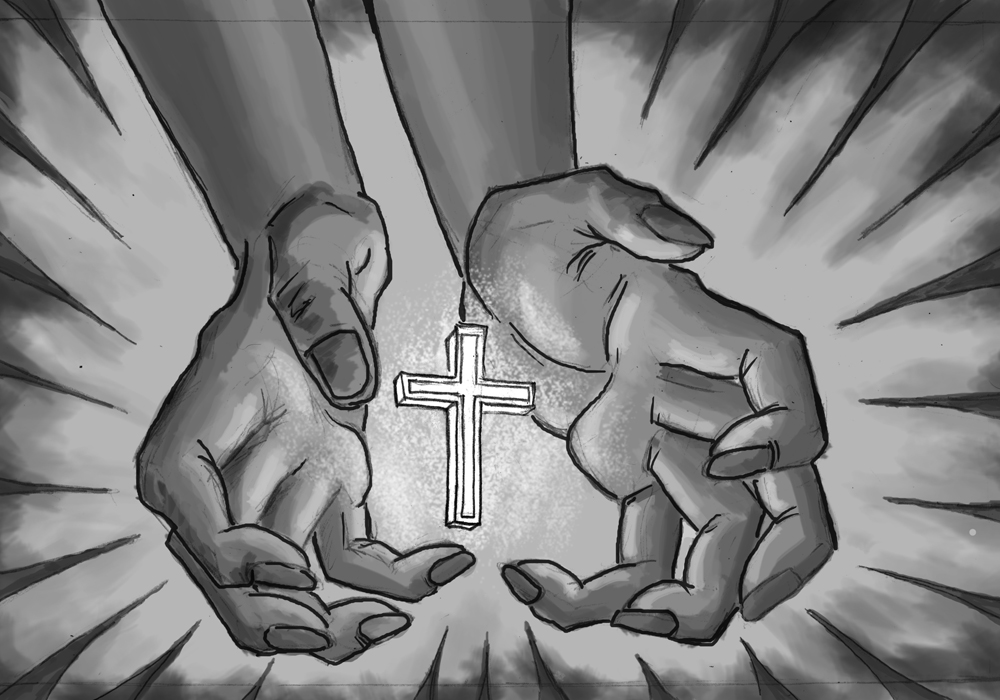Alexia Lawson, Arts Editor
Featured illustration by Christopher Lai
From human rights advocacy to global development solutions, there’s no doubt you’ve discussed religion in your classes, whether it was the focal topic or a side conversation that picked up afterwards. With Christianity’s historical and ideological influences, this religion in particular seems to be an uncomfortable landmine in York classrooms, particularly for Christian students like myself.
“It’s uncomfortable because she’s ignorant.” Uh, no. “She’s afraid her corrupt religion will be exposed.” Wrong again. “She’s just one of those evangelical Christian right-winged, Trump-loving Republicans.” Hold on a minute, let me explain.
I recall in one of my seminars a few weeks ago, we watched The Bible and the Gun, a documentary that showed pre-colonial Africa in all its glory: the rich history, the livelihood of Africans, and the beauty and resources of the land. The claws of colonialism were, of course, inevitable as Europeans inhabited and dispossessed the people and the land. An essential premise of the documentary was the use of the bible in molding African servitude, as Christian missionaries played a role in colonial teachings.
My professor paused the film to open discussion and commentary on the documentary. “Disturbing,” one student responded. “It upsets me to see how Christianity has made black people so ignorant,” another stated in aggravation. His tone suggested that this ignorance was not a thing of the past, but has lingered among followers of the faith today.
There’s no doubt that there have been atrocities carried out in the name of God. However, the classroom has become a hub for suppositions to rise and overgeneralizations to be made. The faults of few individuals become synonymous with the entire religion and its teachings. Christianity gets painted as a tool of oppression and the antithesis to progress. Its followers, painted as incapable of intellect, become problematic on a campus attended by Christian students.
One of my friends ranted after her class about a discussion where her classmates agreed that Christians should not be in university institutions due to their inability to separate academic work from their personal faith, leading them to be ignorant of truth. I was shocked to hear this, but it wasn’t my first time.
The personal bias of professors and TAs is not withheld, as some make blatant or subtle jabs towards Christians or the idea of a God inadvertently, marginalizing Christian students while others in the class learn that such behaviour is acceptable and even encouraged. The social conservatism held by many Christians is also increasingly untolerated on campus, which brings to question the rights to freedom of speech and the freedom of religion.
All of these culminate to the conclusion: Christian students are not welcome here at York.
Despite growing secularization in academic institutions, these perspectives are problematic. The university is meant to be a place of open dialogue, a two-way conversation where even though we agree to disagree, we can still talk.
This common rhetoric that I continue to come across replicates the very “us versus them” mentality that pervades and has lead to division in various societies. How can global issues be addressed when division exists in the very places that try to solve them? If anything, universities should be setting the example by being a reconciling point of oppositional views.
I am not afraid to be challenged, or to be questioned about my beliefs. There is so much understanding that comes from engaging with others’ points of view and academic material.
However, the campus should be a safe space for Christian students, as it is meant to be for all students. Our voices are just as valid.
Tweet us, @excaliburYU




